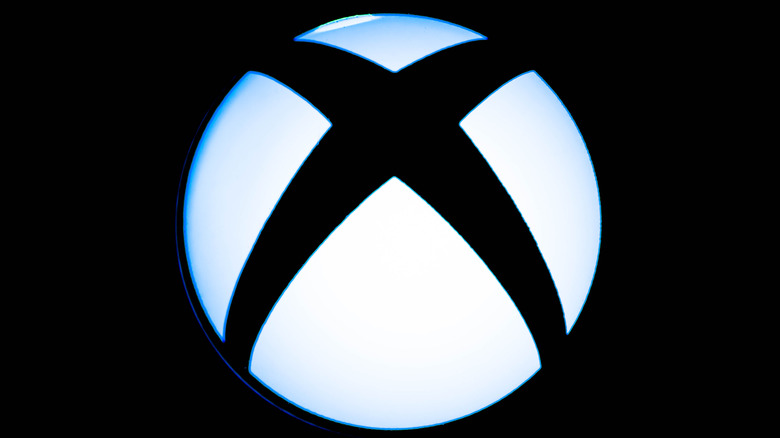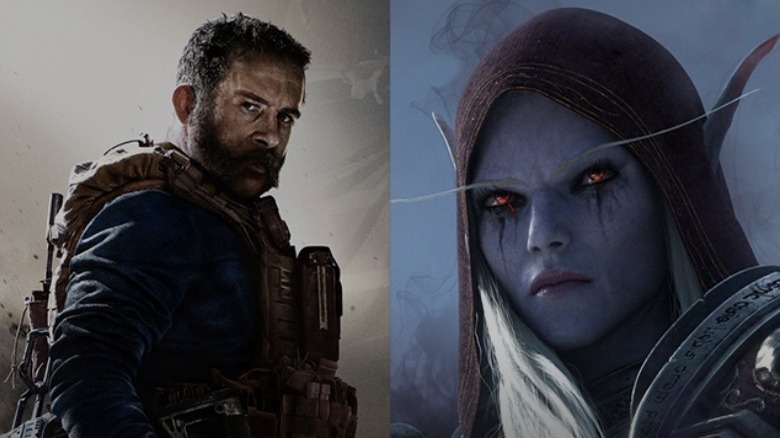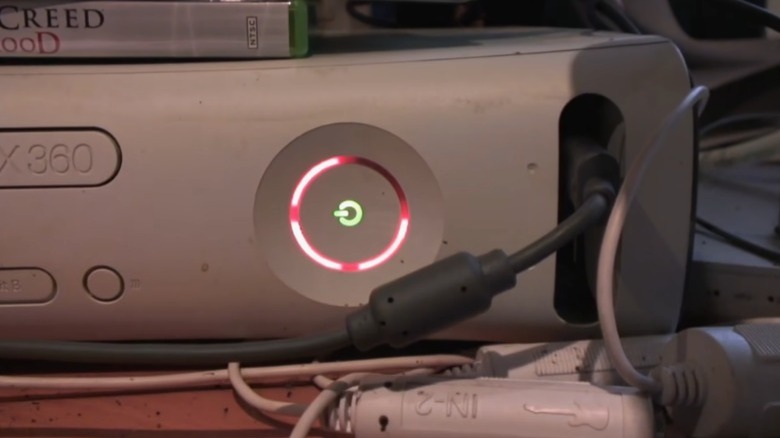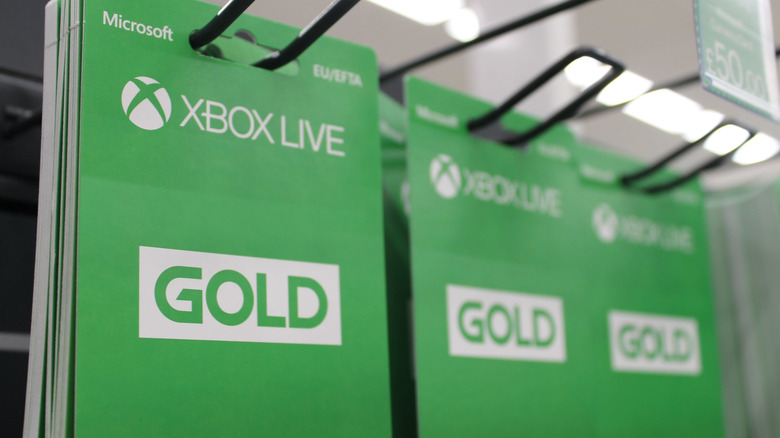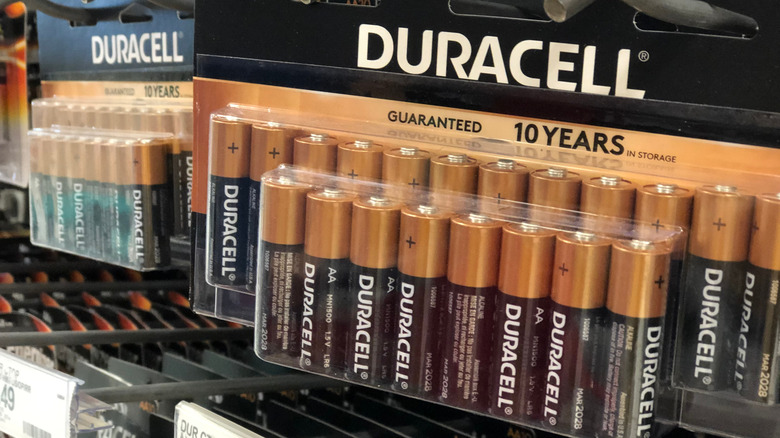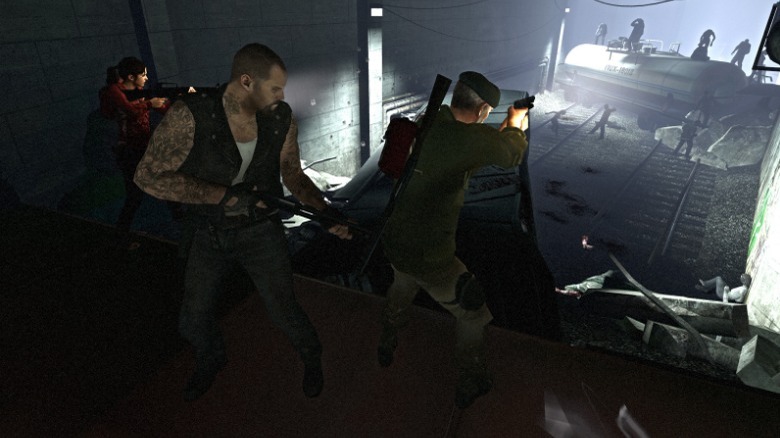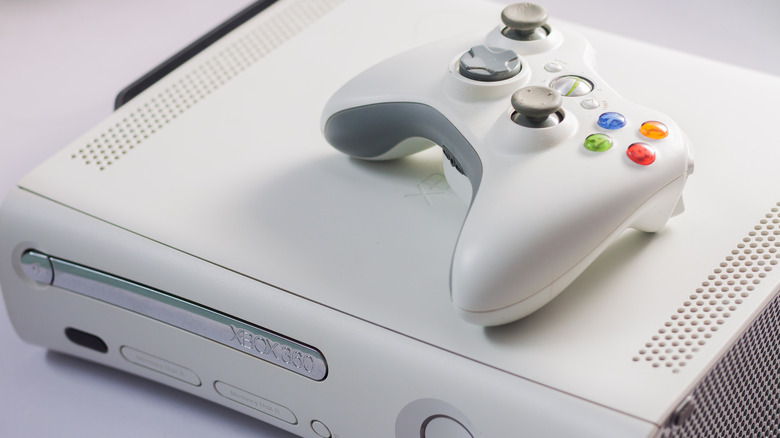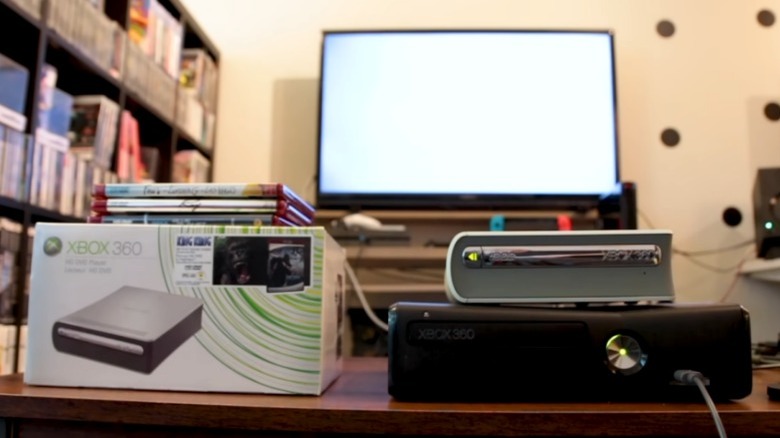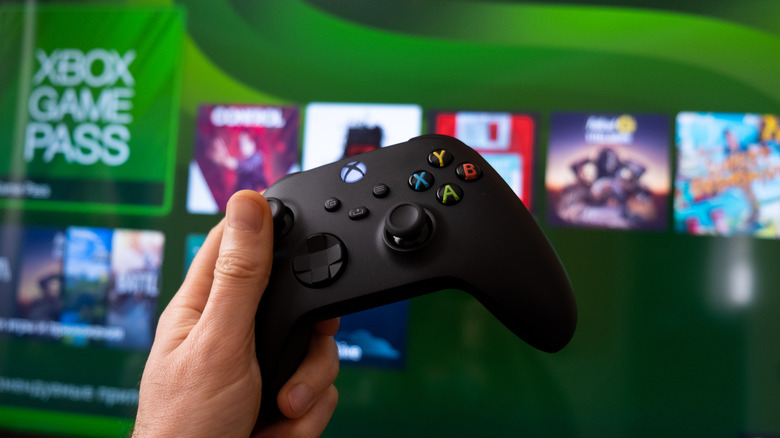The Shady Side Of Xbox
The history of video game consoles is full of good intentions, bad intentions, misguided intentions, and more than a few backstabs. After all, Nintendo reneged on a deal with Sony, and the PlayStation was born as a result. Many console manufacturer hopefuls have come and gone, and right now only Nintendo, Sony, and Microsoft remain as pillars. Each company's products have many fans, excellent games, and skeleton-filled closets. Microsoft might have started later than the others, but it is no exception.
As technology improved, the Xbox transformed numerous times. Microsoft learned from its rivals' mistakes, but it wasn't immune from the occasional gaffe. Some of Microsoft's blunders came from misplaced desires, as was the case with the failed Kinect, but other times the company got a little ahead of itself and made the wrong move. While the Xbox is in a better position than ever before, that doesn't erase Microsoft's history of shady decisions and occasionally downright anti-consumer practices. Over the years, the gaming giant has angered gamers countless times, and some of Microsoft's dubious decisions have even flown under the radar.
Microsoft's purchases might lead to a monopoly
Microsoft has been buying up companies for a while. Bungie was only the first, and Microsoft now owns Rare, Obsidian Entertainment, Double Fine Productions, and has signed a deal to acquire Activision Blizzard. While console manufacturers taking game studios under their wings is nothing new — Sony purchased Bluepoint Games, Housemarque, and Insomniac Games — some people are worried that Microsoft's buying spree might result in a monopoly.
Outlets such as Digital Trends and The Verge have expressed concern over Microsoft's recent purchases since Bethesda and Activision Blizzard aren't just game studios but also publishers. Both sites are worried that Microsoft's mergers could put undue pressure on rival companies and unaffiliated studios. Moreover, since many new games, especially Microsoft-published ones, are released on the Xbox Game Pass, some fear a hypothetical future in which Microsoft raises Game Pass prices as it sees fit due to lack of competition. After all, Xbox tried something similar in 2021.
While some players might hope that Microsoft's purchases won't create a monopoly, the seeds have already been planted. Whenever company representatives talk about games like "The Elder Scrolls 6" and "Starfield," they are unnecessarily coy. Bethesda's Senior Vice President of Global Marketing, Pete Hines, told GameSpot, "'Starfield,' it was announced as a thing that's an Xbox exclusive. I don't know if I would go so far as to say you're done ever playing stuff on PlayStation. But again, I don't know the answer to that right now."
Given these unclear responses and purchases, one can't help but fear that a monopoly is in Microsoft's plans.
Milking the red ring of death for profit and posters
No gaming platform is glitch-proof. While many game issues only exist on the software side and are fixed by simply rebooting the game (usually because the game shuts off unexpectedly), others stem from hardware problems. Arguably the most infamous technical issue to strike game consoles was the "Red Ring of Death," which cost Microsoft a fortune. Over a decade after audiences forgot the problem existed, Microsoft decided to remind gamers...and use that memory for a quick buck.
For those who don't remember, the Red Ring of Death occurred when the Xbox 360 experienced a general hardware failure. Three of the lights that surround the power button would turn red, at which point the console stopped working and almost invariably needed to be sent in for repairs. According to a study performed by the electronics warranty firm SquareTrade, almost a quarter of all 360s were affected — Microsoft ended up footing a repair bill of around $1.15 billion. No, the prevalence wasn't shady; what happened afterwards, however, kind of was.
In 2021, Microsoft commemorated the Red Ring of Death by selling an official poster, which coincided with the release of the documentary "Power On: The Story of Xbox." The Red Ring of Death poster, while no longer available, sold for $25. That doesn't sound too bad — until you compare it to other poster prices. Depending on your store (such as Walmart or Target), posters usually retail between $5 and $15. Microsoft's $25 price tag is comparatively high. Did Microsoft think it had enough clout to charge so much for a poster that celebrated its worst moment?
Apparently yes.
Microsoft could have killed the used game market
Many game publishers and developers hate the pre-owned game market. Ex-Silicon Knights President Denis Dyack once claimed used games "are cannibalizing the industry" (per GamesIndustry.biz), and Microsoft apparently agreed with him so much that the company once tried to make anyone who used hand-me-down games pay a hefty price.
Microsoft's Xbox One reveal will go down in history as one the worst video console announcements ever. Many gamers were excited for the console and expected great things. Instead, they were greeted with anti-consumer features, such as linking game discs to player accounts. As noted by Wired, Microsoft wanted to let players buy a disc, install the game on their console, and then play the game with or without the disc inserted. However, to prevent Xbox owners from passing around discs so their friends wouldn't have to buy one, only the first installer could use the disc, and anyone who subsequently tried to install it onto their console would have to pay a fee. Nobody liked the idea.
The outcry against Microsoft's anti-used game tactic was swift and fierce. Even Sony joined the mockery with a video detailing how to share games on PS4 — a simple two-step operation consisting of a handoff and a thank you. Microsoft quickly walked back its plans (per IGN) and removed all used game restrictions. Xbox owners wouldn't need to pay a fee to install a friend's game on their console, but they would need the disc to play. A reasonable compromise, all things considered.
Microsoft has clearly learned its lesson about restricting pre-owned games, as the Xbox Series X doesn't have any such limitations.
The Xbox One almost had (almost) always-online DRM
Digital rights management (DRM) is a naughty term among gamers. In theory, DRM programs are supposed to cut down on piracy. In practice, however, DRM software cripples game performance (per TheGamer) and ironically only affects paying customers — sometimes, as reported by Eurogamer, pirated versions of games run better than official copies. Usually, DRM is a PC-only problem, but Xbox owners have encountered DRM with predictably devastating results.
When Microsoft announced the Xbox One, it seemingly stated that games couldn't be played offline, so Kotaku reached out for clarification. Microsoft's response was only marginally better. According to Microsoft President Phil Harrison, the Xbox One wouldn't need a constant internet connection, but it would need to connect at least once per day. No daily check-in, no video games — not even single-player ones.
Audiences did not like this limitation one bit, since the internet isn't universally stable for all gamers. The outcry was so deafening that Microsoft reversed its decision, at least temporarily. While the Xbox One shipped without online DRM, Microsoft implemented a similar online verification system for the Xbox Series X|S. According to varying (and somewhat conflicting) reports collected by Niche Gamer, Xbox Series X|S owners need the internet to install their games and verify the installation, but a connection isn't necessary afterwards. Despite this comparatively stripped-back DRM system, many gamers have still predictably run into problems trying to play offline.
No matter how small or noninvasive a DRM seems, it will usually cause problems, and audiences will always protest.
Microsoft tried to increase Xbox Live Gold Price
The video game industry constantly asks audiences to weigh how much they want to pay for a product. Is a title worth $70, or should gamers only consider buying it at a $20 discount? The same applies to multiplayer subscriptions, and although many gamers are ambivalent towards game price increases, they aren't half as affable towards subscription price hikes.
In 2021, gamers were still stuck at home thanks to COVID, and Microsoft decided to ring in the new year with an Xbox Live Gold price increase. Instead of paying $60 a year, subscribers would have to pay $120 a year. Virtually every gamer and their grandma was up in arms and trying to figure out why Microsoft would jack up the cost of Xbox Live Gold.
VentureBeat floated the most convincing argument and theorized the price increase was meant to push Game Pass Ultimate sales. The game rental service, which comes with a constantly-updated library of over 100 games plus Xbox Live Gold, is only $15 a month. That's basically the cost of Xbox Live Gold, just with an inexhaustible collection of games for $5 extra. VentureBeat believed the vanilla Xbox Live Gold's price increase was designed to push more gamers into purchasing the Game Pass.
This subscription hike wasn't a spur-of-the-moment decision, though. According to Forbes, Microsoft had already printed new Xbox Live Gold cards. Clearly, the company thought audiences would welcome the new pricing model, but thanks to overwhelming condemnation, Microsoft scrapped the idea in a possibly record-shattering 14 hours.
Never underestimate a gamer's desire to save money, especially when budgets are tight thanks to an ongoing pandemic.
Batteries sold separately
Most current gaming technology runs on rechargeable batteries and relies on cables to stay topped up. Microsoft's Xbox controllers are one of the few exceptions, as each controller instead comes with two Duracell batteries. Why would a company proudly boast that its latest console has more teraflops than any other console but also use outdated energy tech? There has been a surprising amount of debate surrounding this.
In 2021, Stealth Optional interviewed Duracell UK's Marketing Manager, Luke Anderson, who told the publication that Microsoft has a "constant agreement" with Duracell. According to Anderson, Duracell supplies all of Microsoft's console battery needs, including controller batteries. When the internet caught wind of this interview, many believed it implied that Microsoft's controllers are intentionally behind the times because of this contract. However, Anderson's statement is only half the story.
When Newsweek contacted Microsoft regarding this controversy, the company's representative told a different story. According to Microsoft, the Xbox controller is designed to allow users pick their own energy solution. Players can use either AA batteries or an optional rechargeable battery without being strong-armed into either. On the surface, that sounds like a decent reason, except it doesn't matter whether you constantly purchase AAs or buy the battery pack; either way, the total cost of keeping Xbox controllers energized ends up dwarfing that of PlayStation controllers and their pack-in USB-C cables. Still, if you want an Xbox controller that isn't a "batteries sold separately" device, you can always buy an Elite controller...for $140-$180.
Is it shadier to make controllers more expensive by design or by accident? Let your wallet decide.
Xbox owners had to buy content PC players got for free
One of the biggest weapons in the ongoing console war is console exclusivity. If you want to play "The Legend of Zelda," you need a Nintendo console. Activision also tried to push PS4 copies of "Destiny" and "Destiny 2" by temporarily locking certain content to that console. But at least those extras eventually made it to other platforms, and without any additional cost. When Microsoft tried something similar with a different game, it wasn't half as generous.
When "Left 4 Dead" was still the hot horde shooter on the market, Valve kept it alive with some DLC campaigns. The first, "Crash Course," added new dialogue, achievements, and maps, and PC gamers got it for free. Xbox 360 owners, however, had to shell out $7 for the expansion. One might wonder what convinced Valve to price the DLC differently on consoles — and the answer, unfortunately, is Microsoft.
According to an interview between Eurogamer and Valve's Chet Faliszek, the change in price came down to the distribution platform. Since Valve owns Steam, it can set the prices of its own games, and since Valve wanted to release its "Left 4 Dead" DLC for free, it did just that. Microsoft, however, owns the store players that used to buy Xbox 360 versions, so Microsoft "insisted" that players purchase the DLC. As Faliszek put it, "They wanted to make sure there's an economy of value there." Eurogamer asked Faliszek if Microsoft "enforced" the price, and he neither confirmed nor denied it.
Xbox owners had to pay to play multiplayer games — even the free ones
Everyone who owns a modern console needs a subscription service to play most multiplayer games online. You can't fight opponents around the world in "Super Smash Bros. Ultimate" without Nintendo Switch Online, and you can't use the co-op and PVP features of "Demon's Souls" without PlayStation Plus. However, you can play "Fortnite" on the Switch and PS5 without a subscription, because that game is free-to-play. For the longest time, however, Xbox owners couldn't do the same, all thanks to an Xbox Live Gold restriction.
Before 2021, Xbox owners needed an Xbox Live Gold subscription if they wanted to play any online game, be it "Apex Legends" or "Destiny 2." This decision stuck out like a sore thumb, with Xbox being the only platform on the market that charged gamers for free-to-play titles. Moreover, Microsoft showed no signs of dropping the practice — until it did so without warning.
Shortly after the disastrous Xbox Live Gold price increase reveal, Microsoft announced it would drop the Xbox Live Gold requirement for all free-to-play multiplayer titles, from competitive games like "SMITE" to MMOs such as "Neverwinter." The sudden change took audiences by surprise and was welcomed with open arms, as well as a tiny bit of suspicion. Why did Microsoft suddenly abandon its long-standing stance on free-to-play games? Had Microsoft planned to remove the restriction for a while, and the timing was a coincidence, or was Microsoft desperate to win back some good will?
The Xbox 360 Core edition technically cost more than the Pro edition
Console manufacturers have learned that making some concessions to produce cheaper alternatives can result in a ton of sales. For instance, the Xbox Series S is less powerful than the Series X and lacks a disc drive, but it outsold the Series X in certain markets (per GamesIndustry.biz). However, that is an example of the practice done right; Microsoft botched this concept in the past.
When the Xbox 360 initially released, the console came in Core and Pro editions. The $400 Pro is what most people associate with the console: a wireless controller, an ethernet cable, a headset, an A/V cable, and a 20GB hard drive. The Core, meanwhile, was $100 cheaper and only came with a simpler output cable and a wired controller — no ethernet or hard drive. Some critics felt that the Core edition was tantamount to a scam.
When CNET reviewed the Core edition, the site was highly critical, calling its lack of a hard drive "a deal breaker." Anyone who bought the Core edition would have to purchase a hard drive eventually, and since Xbox 360 hard drives retailed for about $100, CNET questioned the wisdom of trying to save $100 by purchasing the Core in the first place. And, since the other peripherals included in the Pro cost $110, audiences who wanted to save some money with the Core and then buy other parts would end up spending $510.
Eventually, Microsoft realized its mistake and replaced the Core edition with the Arcade edition, which sold for only $200 and included a wireless controller and memory card.
HD DVD player sold separately
When Microsoft introduced the Xbox One, the company touted it as an all-in-one entertainment platform — that's what the "One" in its name stands for. Ironically, one generation earlier, Microsoft wanted to charge its customers extra money if they wanted to turn their console into an all-in-one game/movie player on par with the competition.
At the height of the console war between PlayStation and Xbox, the entertainment world was embroiled in a format war between Blu Ray and HD DVD, and the rival console manufacturers threw their hats into the fight. As noted by The Verge, backed Blu-rays with its PlayStation 3, and Microsoft supported HD DVDs. However, while the PlayStation 3 could play Blu-rays out of the box, the Xbox 360 could not.
Because Microsoft didn't give the Xbox 360 native HD DVD compatibility, anyone who wanted to play one on the console needed to buy a separate HD DVD drive, which initially sold for $199. That price didn't last long. Microsoft lowered the cost to $179 (with five free movies), then down to $129. Apparently, nobody liked Microsoft locking HD DVD playback behind a costly add-on.
Eventually, Microsoft discontinued the HD DVD drive — not-so coincidentally around the time that HD DVDs as a whole were discontinued. While one can't necessarily blame Microsoft for Blu-ray winning the format war, it's not hard to see the connection, especially given the popularity of the rival consoles.
Nobody wanted to make Fable Legends — except for Microsoft
Microsoft has acquired quite a few studios over the years, but unfortunately, Microsoft's backing isn't a guaranteed get-out-of bankruptcy card. Several studios have folded under the company's leadership, and Microsoft might be to blame for one of these failures.
In 2006, Microsoft purchased Lionhead Studios, giving it ownership of the "Fable" franchise. This eventually resulted in the development of "Fable Legends," which was supposed to be a free-to-play 4v1 title. Microsoft used "Fable Legends" to advertise countless gaming features, such as DirectX 12, Windows 10, and PC/Xbox cross-platform play. However, that was part of the problem. According to a report by Eurogamer, developing "Fable Legends" was a nightmare. Lionhead Studios' team ran into design, balance, and technical problems with frightening regularity, and nobody at the company liked it. According to some sources, "Fable Legends" was "in part an attempt to tick the boxes Microsoft kept drawing."
While Lionhead Studios tried to make lemonade out of what was shaping up to be a lemon, eventually problems came to a head and the company had to cancel "Fable Legends." Sadly, the future of Lionhead Studios went along with it. Employees were rightly devastated.
Since accounts state Microsoft was in complete control of "Fable Legends," it's not too far from the truth to point at the company for the game's failure and the closure of Lionhead wouldn't be far off from the truth.
Xbox Live bans players with 'gay' in their profile
In a recent interview with The New York Times, Xbox Vice President Phil Spencer claimed that the Xbox isn't a "free speech platform" and he wants to keep it a fun place for gamers. In order to fulfill that desire, some social discourse policing is required — but how much is too much? Some innocent Xbox owners found out the hard way.
A little over a decade ago, Microsoft banned anyone with the word "gay" in their profile. While this shotgun approach deleted many people who used the word pejoratively (as was Microsoft's intent), others were banned unfairly simply because their names or hometowns just happened to include the letters "g," "a," and "y," in that order. For instance, a gamer named Richard Gaywood was banned because he used his name as his tag (per Kotaku), and another player was banned for selecting Fort Gay, West Virginia (which is a real place) as his hometown (per BBC). Even more egregious, at least one Xbox user claimed they were banned because she identified as lesbian on her profile.
Even though Microsoft had seemingly noble intentions, the company was hit by tons of complaints. This tidal wave of criticism convinced the company to reexamine its methods, which former Director of Xbox Live Policy Stephen Toulouse described as "inelegant." After much reflection, Microsoft officially changed its policies to let profiles openly express sexual orientation and use words like "gay" and "bi."
While fans can't exactly hold Microsoft responsible for every unintentional ban, it's concerning that the company assumed that everyone who used the word "gay" in their profiles did so maliciously.

